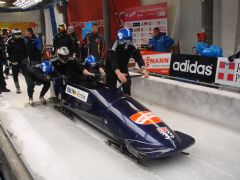As I discussed several weeks ago, this discussion will continue for months to come & whilst Dwain would not want this issue to dominate the column inches around the time of the Olympics, there is no doubt that it will be more of a focus of debate than is probably appropriate. I think it is notable that Dwain & David Millar have been completely off the radar since the announcement & it must not be allowed to become a personal issue.
CAS stated that it was seeking "a consistent fight against doping", which has been the issue all along. Whilst several athletes have publicly stated that they would support the ruling, all have substantiated that viewpoint by supporting the BOA's standpoint in theory & would have preferred the rest of the World to step into line with GB. Since the announcement, Paula (Radcliffe) has aligned with this perspective, commenting that "This isn't about Dwain Chambers; this is a far wider issue. It's about a bigger deterrent being in place". In an article published in the Daily Express, Paula continued "If WADA is not listening to the World's athletes, then we have to make them. Athletes have a voice. We can put pressure on WADA to make this tougher."
The matter has understandably polarised opinion in the athletics community & the cycling fraternity appears no different. Sir Chris Hoy pre-empted the CAS ruling by opining that "It will be sad if we have to fall in line with the rest of the World...I think it should be the rest of the World that's falling in line with our rules". He queried whether it would be a backward step in the fight to keep sport clean if the BOA was to be forced to back down on its ruling that a positive test should mean a lifetime Olympic ban. Fellow cyclist Gerraint Thomas added "I've no issues with him (David Millar) personally. He does a lot of good for the sport, but at the same time that ruling was great for Britain. It was a real hard stance on doping."
Ironically, in the immediate build up to the CAS statement, British Bobsleigh announced that an, as yet unnamed, GB athlete in their sport had tested positive for a banned substance & was informed on February 25th. In light of the CAS ruling, a positive B sample would, according to WADA regulations, incur a two year ban & thus rule the offending athlete out of the 2014 Sochi Winter Olympics.
In the meantime, athletes wanting to gain a legal edge in their training should read a paper published in Experimental Physiology by Jonathon Folland's Loughborough group. Their study investigated the neural & peripheral adaptations to a 4-week period of explosive training, focussing on the knee extensors.
The experimental group comprised 10, moderately active male subjects, aged 20 /- 2 years & following 2 measurement/familiarisation sessions, the men participated in a 4-week programme of isometric, explosive strength training, conducted on one, randomly assigned leg. The aim of the training protocol was to "enhance explosive, rather than maximal force production, whilst minimising the volume of loading & fatigue." Rather a practically applicable question that has been posed, here!
The results demonstrated that after a 4-week period, the training improved maximal voluntary force (increased by 11% in the trained leg, in addition to a 4% increase in the untrained leg), involuntary explosive force, maximal strength & stiffness of the muscle tendon unit at high force levels. The capacity of the muscle tendon unit for explosive force production in the early & late phases in response to electrical stimulation, increased "in proportion to maximal strength, suggesting a common peripheral mechanism that may be hypertrophy", as a significant increase in the muscle thickness of the trained leg was also recorded.
Although it must be remembered that the experimental group was only small (n=10), whilst consisting of untrained subjects, the paper is a worthwhile read & warrants further investigation in an elite sporting population.
Tillin, N.A., Pain, M.T.G. & Folland, J.P. (2012). Short-term training for explosive strength causes neural & mechanical adaptations. Experimental Physiology; 0(0): p 1-12
Thanks Raph for bringing this paper to my attention!!

